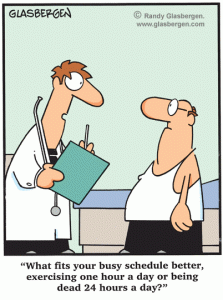“These results suggest that exercise and body weight are important independent correlates of QoL in endometrial cancer survivors…”
Exercise may reduce your risk of endometrial cancer (EC), it may help the EC patient weather chmotherapy better and exercise be a critical component of EC relapse prevention, and walking for thirty minutes a day five days a week is enough to make a difference. And the real kicker? You don’t need to exercise all that hard to reduce your risk of endometrial cancer. Walk at lunch. Climb the stairs at work. The bottom line? Get your heart rate up.
Also, I linked a blog post of mine in the “Recommended Reading” section that talks about coffee being a wonder drug. While coffee has many anti-cancer benefits I find that my two cups in the morning help me not only get to the gym but help me work-out longer at the gym. Something to think about.
I am a cancer survivor and cancer coach. Years of experience and research have shown me that there are dozens of evidence-based, non-toxic, non-conventional therapies to reduce cancer and to reduce the risk of cancer’s relapse. And that frequent, moderate exercise is one of the best therapies out there.
To learn more about evidence-based, non-toxic EC therapies please scroll down the page, post a question or comment and I will reply to you ASAP.
Thank you,
David Emerson
- Cancer Survivor
- Cancer Coach
- Director PeopleBeatingCancer
Recommended Reading:
Endometrial Cancer- Detoxify to Reduce your Risk of Diagnosis and Relapse
Can Coffee Be A Health-Promoting Wonder Drug?!?!
Are Endometrial Polyps Overtreated?
“EC refers to several types of malignancies that arise from the endometrium, or lining, of the uterus. Endometrial cancers are the most common gynecologic cancers in the United States, with over 35,000 women diagnosed each year. The incidence is on a slow rise secondary to the obesity epidemic. The most common subtype, endometrioid adenocarcinoma, typically occurs within a few decades of menopause, is associated with obesity, excessive estrogen exposure, often develops in the setting of endometrial hyperplasia, and presents most often with vaginal bleeding…
EC may sometimes be referred to as uterine cancer. However, different cancers may develop not only from the endometrium itself but also from other tissues of the uterus, including cervical cancer, sarcoma of the myometrium, andtrophoblastic disease.
“Objectives. Lack of exercise and excess body weight may exacerbate treatment-related declines in quality of life (QoL) in endometrial cancer survivors. The primary purpose of this study was to examine the associations among exercise, body weight, and QoL in a population- based sample of endometrial cancer survivors…
Conclusions. These results suggest that exercise and body weight are important independent correlates of QoL in endometrial cancer survivors…”
“Women who exercise for at least 150 minutes a week might have a reduced risk for endometrial cancer, according to a study presented here at the Ninth Annual American Association for Cancer Research (AACR) International Conference on Frontiers in Cancer Prevention Research…
Exercise cuts the risk even for women who overweight, said Hannah Arem, a doctoral candidate at the Yale School of Public Health in New Haven, Connecticut. She spoke during a press conference at the meeting…
This is important in light of the fact that body mass index (BMI) “is one of the major risk factors for endometrial cancer,” she explained.
The exercise that counted in the study’s tallies was “moderate- to vigorous-intensity sports/recreational physical activity.”
“Does vigorous walking at conferences count?” Dr. Garber’s humor implicitly hinted at a challenge in the findings: that working out 5 days a week for 30 minutes is a tall order for many busy professionals.
Hormone and lifestyle factors explain up to 80% of risk for endometrial cancer, Ms. Arem said.
Exercise Cuts Risk, Even for the Overweight- Women who were normal weight but inactive had a 55% lower risk for endometrial cancer than inactive women who were overweight. Women who were overweight but active had a 38% lower risk for endometrial cancer.
In summary, risk reduction occurred in all women who exercised at the study’s required threshold, regardless of their weight. “Exercise is an important public health intervention for women at risk of endometrial cancer,” said Ms. Arem.”

